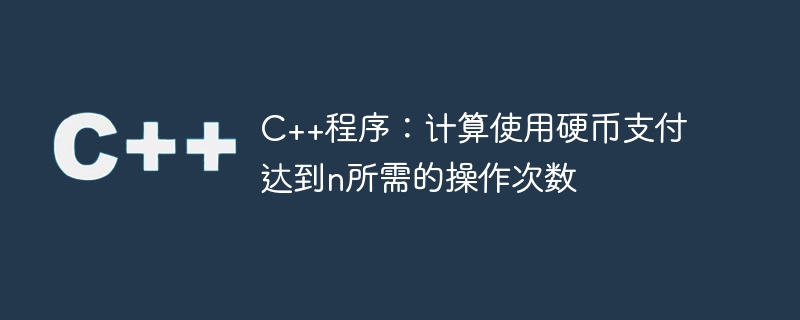C++程序:计算使用硬币支付达到n所需的操作次数

假设我们有五个数字,N,A,B,C,D。我们从数字0开始,结束于N。我们可以通过一定数量的硬币来改变一个数字,具体操作如下:
- 将数字乘以2,支付A个硬币
- 将数字乘以3,支付B个硬币
- 将数字乘以5,支付C个硬币
- 增加或减少数字1,支付D个硬币
我们可以任意次数以任意顺序执行这些操作。我们需要找到达到N所需的最少硬币数量
因此,如果输入是N = 11; A = 1; B = 2; C = 2; D = 8,那么输出将是19,因为最初x为0。
用8个硬币将x增加1(x=1)。
用1个硬币将x乘以2(x=2)。
用2个硬币将x乘以5(x=10)。
用8个硬币将其增加1(x=11)。
步骤
为了解决这个问题,我们将按照以下步骤进行:
Define one map f for integer type key and value Define one map vis for integer type key and Boolean type value Define a function calc, this will take n if n is zero, then: return 0 if n is in vis, then: return f[n] vis[n] := 1 res := calc(n / 2) + n mod 2 * d + a if n mod 2 is non-zero, then: res := minimum of res and calc((n / 2 + 1) + (2 - n mod 2)) * d + a) res := minimum of res and calc(n / 3) + n mod 3 * d + b if n mod 3 is non-zero, then: res := minimum of res and calc((n / 3 + 1) + (3 - n mod 3)) * d + b) res := minimum of res and calc(n / 5) + n mod 5 * d + c if n mod 5 is non-zero, then: res := minimum of res and calc((n / 5 + 1) + (5 - n mod 5)) if (res - 1) / n + 1 > d, then: res := n * d return f[n] = res From the main method, set a, b, c and d, and call calc(n)
Example
让我们来看下面的实现以更好地理解 −
#include <bits/stdc++.h>
using namespace std;
int a, b, c, d;
map<long, long> f;
map<long, bool> vis;
long calc(long n){
if (!n)
return 0;
if (vis.find(n) != vis.end())
return f[n];
vis[n] = 1;
long res = calc(n / 2) + n % 2 * d + a;
if (n % 2)
res = min(res, calc(n / 2 + 1) + (2 - n % 2) * d + a);
res = min(res, calc(n / 3) + n % 3 * d + b);
if (n % 3)
res = min(res, calc(n / 3 + 1) + (3 - n % 3) * d + b);
res = min(res, calc(n / 5) + n % 5 * d + c);
if (n % 5)
res = min(res, calc(n / 5 + 1) + (5 - n % 5) * d + c);
if ((res - 1) / n + 1 > d)
res = n * d;
return f[n] = res;
}
int solve(int N, int A, int B, int C, int D){
a = A;
b = B;
c = C;
d = D;
return calc(N);
}
int main(){
int N = 11;
int A = 1;
int B = 2;
int C = 2;
int D = 8;
cout << solve(N, A, B, C, D) << endl;
}输入
11, 1, 2, 2, 8
输出
19
以上是C++程序:计算使用硬币支付达到n所需的操作次数的详细内容。更多信息请关注PHP中文网其他相关文章!

热AI工具

Undresser.AI Undress
人工智能驱动的应用程序,用于创建逼真的裸体照片

AI Clothes Remover
用于从照片中去除衣服的在线人工智能工具。

Undress AI Tool
免费脱衣服图片

Clothoff.io
AI脱衣机

AI Hentai Generator
免费生成ai无尽的。

热门文章

热工具

记事本++7.3.1
好用且免费的代码编辑器

SublimeText3汉化版
中文版,非常好用

禅工作室 13.0.1
功能强大的PHP集成开发环境

Dreamweaver CS6
视觉化网页开发工具

SublimeText3 Mac版
神级代码编辑软件(SublimeText3)

热门话题
 CUDA之通用矩阵乘法:从入门到熟练!
Mar 25, 2024 pm 12:30 PM
CUDA之通用矩阵乘法:从入门到熟练!
Mar 25, 2024 pm 12:30 PM
通用矩阵乘法(GeneralMatrixMultiplication,GEMM)是许多应用程序和算法中至关重要的一部分,也是评估计算机硬件性能的重要指标之一。通过深入研究和优化GEMM的实现,可以帮助我们更好地理解高性能计算以及软硬件系统之间的关系。在计算机科学中,对GEMM进行有效的优化可以提高计算速度并节省资源,这对于提高计算机系统的整体性能至关重要。深入了解GEMM的工作原理和优化方法,有助于我们更好地利用现代计算硬件的潜力,并为各种复杂计算任务提供更高效的解决方案。通过对GEMM性能的优
 word文档怎么计算加减乘除
Mar 19, 2024 pm 08:13 PM
word文档怎么计算加减乘除
Mar 19, 2024 pm 08:13 PM
WORD是一个强大的文字处理器,我们可以利用word进行各种文字的编辑,在Excel表格当中,我们已经熟练掌握了加减乘数的运算方法,那么如果需要在Word表格里,计算数值的加减乘数,该如何操作呢,难道只能用计算器计算吗?答案当然是否定的,WORD也同样可以完成。今天小编就来教大家如何在Word文档的表格当中,运用公式计算加减乘除等基本运算,一起来学习一下吧。那么,今天就让小编具体演示一下,WORD文档怎么计算加减乘除?第一步:打开一个WORD,单击工具栏【插入】下的【表格】,在下拉菜单当中插入一
 如何使用Python的count()函数计算列表中某个元素的数量
Nov 18, 2023 pm 02:53 PM
如何使用Python的count()函数计算列表中某个元素的数量
Nov 18, 2023 pm 02:53 PM
如何使用Python的count()函数计算列表中某个元素的数量,需要具体代码示例Python作为一种强大且易学的编程语言,提供了许多内置函数来处理不同的数据结构。其中之一就是count()函数,它可以用来计算列表中某个元素的数量。在本文中,我们将详细介绍如何使用count()函数,并提供具体的代码示例。count()函数是Python的内置函数,用于计算某
 在Java中递归地计算子字符串出现的次数
Sep 17, 2023 pm 07:49 PM
在Java中递归地计算子字符串出现的次数
Sep 17, 2023 pm 07:49 PM
给定两个字符串str_1和str_2。目标是使用递归过程计算字符串str1中子字符串str2的出现次数。递归函数是在其定义中调用自身的函数。如果str1是"Iknowthatyouknowthatiknow",str2是"know"出现次数为-3让我们通过示例来理解。例如输入str1="TPisTPareTPamTP",str2="TP";输出Countofoccurrencesofasubstringrecursi
 如何使用C#中的Math.Pow函数计算指定数的幂次方
Nov 18, 2023 am 11:32 AM
如何使用C#中的Math.Pow函数计算指定数的幂次方
Nov 18, 2023 am 11:32 AM
在C#中,有一个Math类库,其中包含许多数学函数。其中包括计算幂次方的函数Math.Pow,它可以帮助我们计算指定数的幂。Math.Pow函数的用法非常简单,只需要指定底数和指数就可以了。其语法如下:Math.Pow(base,exponent);其中base表示底数,exponent表示指数。该函数返回double类型的结果,即幂次方的计算结果。下面让
 使用行列式计算三角形面积的Java程序
Aug 31, 2023 am 10:17 AM
使用行列式计算三角形面积的Java程序
Aug 31, 2023 am 10:17 AM
简介使用行列式计算三角形面积的Java程序是一个简洁高效的程序,可以根据给定三个顶点的坐标来计算三角形的面积。该程序对于学习或使用几何的任何人都非常有用,因为它演示了如何在Java中使用基本算术和代数计算,以及如何使用Scanner类读取用户输入。程序提示用户输入三角形三个点的坐标,然后将其读入并用于计算坐标矩阵的行列式。使用行列式的绝对值来确保面积始终为正,然后使用公式计算三角形的面积并显示给用户。该程序可以轻松修改以接受不同格式的输入或执行附加计算,使其成为几何计算的多功能工具。决定因素行列
 计算矩阵右对角线元素之和的Python程序
Aug 19, 2023 am 11:29 AM
计算矩阵右对角线元素之和的Python程序
Aug 19, 2023 am 11:29 AM
一种受欢迎的通用编程语言是Python。它被应用于各种行业,包括桌面应用程序、网页开发和机器学习。幸运的是,Python具有简单易懂的语法,适合初学者使用。在本文中,我们将使用Python来计算矩阵的右对角线之和。什么是矩阵?在数学中,我们使用一个矩形排列或矩阵,用于描述一个数学对象或其属性,它是一个包含数字、符号或表达式的矩形数组或表格,这些数字、符号或表达式按行和列排列。例如−234512367574因此,这是一个有3行4列的矩阵,表示为3*4矩阵。现在,矩阵中有两条对角线,即主对角线和次对
 Java程序示例,用于计算总分和百分比
Sep 11, 2023 pm 06:01 PM
Java程序示例,用于计算总分和百分比
Sep 11, 2023 pm 06:01 PM
我们将演示如何使用Java程序计算总分和百分比。总分是指所有可用分数的总和,而术语百分比是指计算分数除以总分并乘以所得的数字100。percentage_of_marks=(obtained_marks/total_marks)×100示例1这是一个Java程序,用于演示如何计算总分和百分比。//JavaProgramtodemonstratehowisTotalmarksandPercentagescalculatedimportjava.io.*;publicclassTotalMarks_






